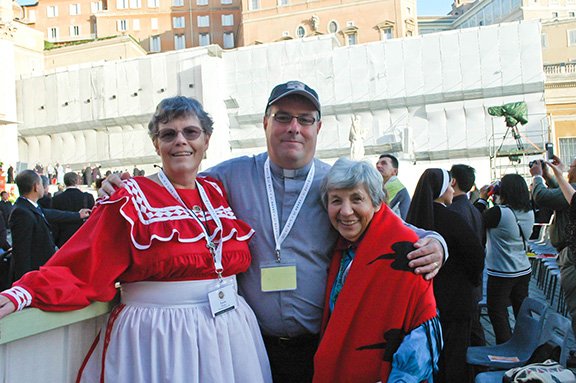
Laura Waters, a member of the Choctaw Nation, Deacon Dana Nearmyer who is part Cherokee, and Sister Virginia Pearl, CSJ, a Potawatomi, wait for the canonization ceremony for Kateri Tekakwitha.
Archdiocesan pilgrims travel to rome for canonization ceremony
by Joe Bollig
joe@theleaven.org
KANSAS CITY, Kan. — Most children love to hear stories, and when Sister Virginia Pearl, CSJ, was little, she loved to hear her mother tell stories about a wonderful Native American girl.
That Native American girl lived long ago in the land of the Algonquin and Mohawk peoples, now upstate New York and southern Quebec. Her name was Kateri Tekakwitha.
“Mother talked a lot with us kids about this ‘little saint,’ as she called her,” said Sister Virginia, who lives at the Sisters of St. Joseph of Concordia motherhouse in Concordia. Her Potawatomi name is “Na-me-que,” which means “praying woman.”
Sister Virginia liked this “little saint” because she was Native American — just like her.
On Oct. 21, Sister Virginia stood in the square of St. Peter’s Basilica in Rome to hear Pope Benedict XVI declare her mother’s “little saint” an official saint of the Catholic Church.
Sister Virginia, who was there as an official representative of the Prairie Band Potawatomi and is herself Potawatomi, was surrounded by other Native Americans from Canada and the United States, as well as those who were there to witness the canonization of six other newly proclaimed saints.
Sister Virginia wasn’t the only Potawatomi from Kansas in St. Peter’s Square that day. Also in the crowd of thousands was Jerry Tuckwin, a member of the Haskell Catholic Campus Center in Lawrence.
Tuckwin, a former track coach and athletic director at Haskell Indian Nations University in Lawrence, said he went to witness the canonization because St. Kateri is a tremendous role model for all Native Americans.
“One of the things that’s really big with Native Americans is role modeling,” he said. “I think any time you can be a part of something you can bring from it role modeling traits and characteristics, then I want to be part of that.”
Jerry and his wife Terry were part of a 750-member tour group, although not all members of the group were Native American. They were in Italy from Oct. 18 to 24.
On the Friday before the canonization, the Tuckwins attended a reception at the Vatican Gardens where they listened to a welcome by the U.S. ambassador to the Holy See. Later, they toured the Vatican Museums.
On Saturday, the Tuckwins went to Assisi, and then attended a Mass at St. Peter’s Basilica celebrated by Archbishop Charles Chaput of the Archdiocese of Philadelphia, himself a Citizen Band Potawatomi from Kansas.
“It was very important for us to be part of this historic moment,” said Terry Tuckwin. “[Jerry] was thinking of his old auntie who raised him and has gone on to the next world, thinking what this day would have been for her and many of the [tribal] elders who prayed for that day.”
A reporter for the “CBS Evening News” interviewed Jerry Tuckwin — who was assisting a Native American Capuchin Franciscan priest — as they left the square after the liturgy.
Deacon Dana Nearmyer was part of a 20-member official archdiocesan pilgrimage group led by Msgr. Thomas Tank, pastor of the Church of the Ascension in Overland Park, and Rose Hammes, archdiocesan director of communications and planning.
A separate 40-member group from the Church of the Nativity in Leawood, led by pastor Father Francis Hund, was also in Rome for the canonization. A happy coincidence brought them there, because the Nativity group booked its trip before the canonization was announced.
“There have been 20,000 kids from the archdiocese who have attended Camps Kateri and Tekakwitha [at Prairie Star Ranch in Williamsburg], and have developed an affinity for her,” said Deacon Nearmyer.
“Many . . . consider St. Kateri to be one of their primary prayer intercessors,” he continued. “A number of them have taken her name as their confirmation saint or have named their kids after her.”
A number of these youths are working or attending universities in Europe, and they flocked to Rome to attend the canonization.
One touching moment Deacon Nearmyer remembers is when Sister Virginia Pearl and Laura Waters, a member of the Choctaw Nation and part of the archdiocesan pilgrimage group, were greeted by other Native Americans.
“At one point, we were standing next to a group of Mohawk Indians,” he said. “They told us, ‘We’re so happy you’re here — St. Kateri is from our tribe.’ They started to weep and tell us stories about the Jesuit missionaries who had come to bring Christ to their nation.”
The Mohawks called it a “healing” that the church now recognized that one of their own was being recognized as a great faith leader.
“I may sound like I’m crying, but it’s pride and joy instead of tears,” said Sister Virginia.
“It was a very deep experience,” she continued. “To be present when the Holy Father sainted those men and women, it was just like bringing up my childhood faith and honoring my mother and father. It’s almost like [blessing] who I am as a Native American and a woman religious.”






